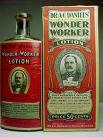 Watching the upheavals in world markets, particularly in the banking sector, it's hard not to arrive at the conclusion that much of the hysteria comes down to a deep mistrust in many of the individual brands standing on the fault-lines.
Watching the upheavals in world markets, particularly in the banking sector, it's hard not to arrive at the conclusion that much of the hysteria comes down to a deep mistrust in many of the individual brands standing on the fault-lines. The queues of people at the cashier desks, removing their money to somewhere safer, certainly don't seem to buy the assurances of those at the top that everything is going to be alright. The mood in the streets suggests that no-one really believes what they're being told and that the once-dormant evasions and half-truths of the past have erupted, with confidence hurtling downhill faster than those in the financial institutions can run.
When you consider the vast amounts of money that have been spent in winning our affections, it's shocking to see how quickly things come tumbling down, and how many of the banks stand isolated and vulnerable.
 Where is the bedrock? Much of what has been built is foundering on the sands of self-interest. None of the banks is emerging as a bastion of integrity and good sense.
Where is the bedrock? Much of what has been built is foundering on the sands of self-interest. None of the banks is emerging as a bastion of integrity and good sense. For those whose savings or business fortunes are tied up a financial house, there's no comfort to be found in the shadow of a teetering giant that might collapse following the next eruption.
Am I being over-dramatic? Again, think of the ads with which we've been inundated over the past years and ask yourself how many of them were concerned with building trust. How many of us truly believe that our lending institutions have our best interests at heart? Even the better of them seem to enter into shadowy arrangements that strike us as having more to do with speculation than investment.
Almost certainly, once the tremors have subsided, we'll hear how we've all over-reached ourselves and words like 'prudence', 'frugality' and 'caution' will be bandied about by the financiers. But there was little caution shown by those same leaders and politicians when the markets were at their height.
In the aftermath, the real challenge to the financial brands is not to lecture us on our spending habits but to build instead on solid rock and earn the trust of a deeply suspicious public.

